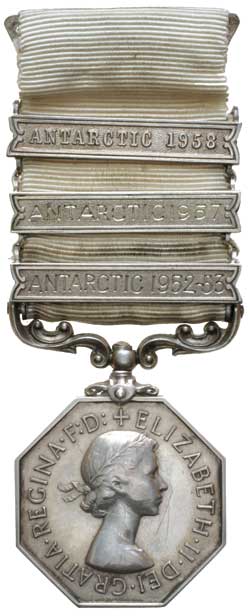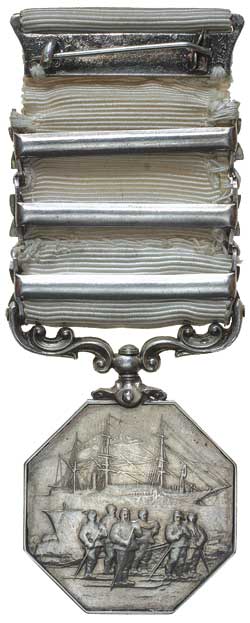Orders, Decorations & Medals - Australian
Lot 3500 Session 12 (11:30am Thursday) Orders, Decorations & Medals - Australian
Estimate $7,000
Bid at live.noble.com.au
SOLD $7,200
POLAR MEDAL, (EIIR), - three clasps - Antarctic 1952-53, Antarctic 1957, Antarctic 1958. The first and second clasps engraved, the last die struck, all as issued. Peter W. King. Impressed. Some obverse scratching, otherwise very fine and rare.
Together with case of issue and name card bearing gold printed Queen's crown and typed name, 'P.W.King, Esquire'; photos and manuscript copies of the five books compiled and written by Peter Wylie King.
Antarctic 1952-53 - Silver medal, LG 1/3/1955, p1269 - For good service as member of the Falkland Islands Dependencies Survey in Antarctic expeditions between the years 1949-1954, to Peter Wylie King, Wireless Operator Mechanic, Hope Bay, 1952-1953.
Antarctic 1957 - Clasp, LG 5/1/1960, p187; CAG 4, 14/1/1960 - For good service as member of the Australian Antarctic Research Expedition to Mawson and Davis 1957, to Peter Wylie King, Radio Officer, Mawson.
Antarctic 1958 - Second clasp, LG 21/7/1961, p5401; CAG 60, 27/7/1961 - For good service as member of the Australian National Antarctic Research Expedition to Mawson and Davis 1958, to Peter Wylie King, Radio Officer, Mawson.
Peter Wylie King, wartime radio operator with British Merchant Navy and Royal Air Force, Antarctic Expeditioner and author, had a boys-own-adventure of a lifetime. His biographical entry on p559 in British Polar Exploration and Research, A Historical and Medallic Record with Biographies, 1818-1999 by Lieutenant Colonel Neville W.Poulsom and Rear Admiral J.A.L.Myres CB reads as follows;
'Born 14.10.21. Served as a radio officer in the British Merchant Navy during the Second World War, and also had two years with the Royal Air Force as a radio operator. He worked as a radio officer in a Norwegian cargo boat which was sold in Shanghai. He left England in October 1946 for Adelaide, Australia. In 1947, having written to Sir Douglas Mawson applying for the position as Radio Operator for an Australian Antarctic Expedition then being formed, he was selected to serve on Macquarie Island for the first year in 1948.
In 1951 he returned to England and joined the Falkland Islands Dependencies Survey, spending 1952-54 at Hope Bay working on the hut and installing radio equipment. During this tour at Hope Bay he took part in a sledging journey to Duse Bay and Cape Lachman. After this he took over as Radio Officer in RSS John Biscoe for two seasons, during which he visited South Georgia and all the British bases in the Antarctic Peninsula.
In 1955 he returned to Adelaide and applied to go south again with the Australian National Antarctic Research Expedition and was selected to go to Mawson Station in late 1956. He flew to New Zealand and then via the American Icebreaker Northwind visited Mc Murdo from where he visited the American base at Cape Adare and transferred to MV Kista Dan off Wilkes Base (now Casey Station), then on to serve at Mawson Station during 1957 and 1958. During the first year he twice visited Taylor Rookery (Emperor Penguins) for two weeks, and two weeks in the Prince Charles Mountains at Beaver Lake. In the second year he helped full time with the dogs. He and two others were flown to Amundsen Bay by Beaver Aircraft with sledges, dogs, food and equipment. From Amundsen Bay they did a 10 week and 410 mile running traverse back to Mawson Station. A mountain (Mt.King), 1,425m high, in Enderby Land, is named after him.
In 1977 after some twenty years interval he was again selected to fill the appointment of Radio Officer at Casey Station during which he took part on a three month ice core drilling trip some 50 miles inland from Casey Station. Finally, in 1979, he went back to Macquarie Island as Radio Officer.'
During his war service in the Royal Air Force he was involved with intercepting German radio traffic for decoding. Post war he expressed an interest in going to the Antarctic after seeing a request for expeditioners to the Antarctic and he promptly wrote to Douglas Mawson and was subsequently selected to serve at Macquarie Island in 1948. He met Mawson for tea returning from the expedition, which Mr King's step-son, Viktor Koskovic, described as the greatest thrill of his step-father's life. As detailed above, he went on to serve as an expeditioner on several occasions during the ensuing 30 odd years. His service record reads as follows;
Wintering Expeditions Macquarie Island - Radio Operator, 1948.
Falkland Islands Dependencies Survey 1952-53 - Wireless Operator Mechanic and one of a party of 7.
Mawson Station - Radio Officer, 1957, one of a party of 28.
Mawson Station - Radio Officer, 1958 one of a party of 33.
Casey - Weather Observer-in-Charge, 1977.
Macquarie Island - Radio Officer, 1979.
Note: Peter Wylie King (nickname 'Snipe'), Radio Operator, 1957, 1958 - one of only five expeditioners to have spent two years in a row at Mawson (Aurora June 1996, p15).
Peter Wylie King's first wintering expedition was with the Macquarie party which was charged with establishing a new camp to replace the one set up by Mawson in 1911. It was decided to base it on the same site as used by Mawson. The going was tough because as Phillip Law is quoted as saying, 'Macquarie Island is 'wet' cold. The wind hardly ever stops. There's generally fog too. You often don't see the plateau top exposed, and with the wind comes driving rain.' The party was delivered by LST3501 and army DUKWs were used along with LCVP craft to deliver the men and supplies to shore. Some craft were lost in the extremely hazardous conditions. Peter King recalled that one night a sudden wind change marooned a large party of about 60, including the naval crew, on shore. This presented a real challenge to the cook to feed them however with ingenuity he was able to do so and then the group had to cram themselves into 4 tents.
During his winter at Macquarie Island, the party lost one of its members, Charles Scobie, who had gone skiing with one of the other men and broke through the ice on a frozen lake. Both men had a major struggle to survive and unfortunately, Scobie succumbed and drowned. Many of the party were ex-servicemen and in Tim Bowden's book, The Silence Calling, p64 he writes that Peter King believed being ex-servicemen helped them to adjust to Scobie's death. King said, 'We just coped with it. It's the same in the army. You lose mates fighting wars, and carry on. You have to.'
Peter married his first wife, Barbara King (nee Kendall) in 1960. Later he worked near Adelaide, caring for her as she suffered renal disease before she died in 1974. He then wintered a few more times but when his step-son, Viktor Koskovic, moved to Tasmania in the 1980s, he followed, helping at Launceston's St Giles Child Development Disability Centre. It was there that he met his second wife, Charlotte. They moved to Devonport in about 1996 and were active members of Devonport Community Church and once again Peter King cared for his wife when she became ill up until her death in 2001.
In his latter years, Peter wrote a series of books, A boy's dreams come true: memoirs of pioneer Pete by Peter W.King, 148pp, 2007 A boy's dreams come true: memoirs of pioneer Pete by Peter W.King, Part 2, 125pp, 2008 A boy's dreams come true: memoirs of pioneer Pete by Peter W.King, Part 3, 112pp, 2008 A boy's dreams come true: memoirs of pioneer Pete, my new life in Tasmania by Peter W.King, Part 4, 101pp, 2009 A boy's dreams come true: memoirs of pioneer Pete, my new life in Tasmania by Peter W.King, Part 5, 59pp, 2009.
Peter had become increasingly frail during the last few years of his life however, he remained cognitively sharp and always liked to talk about his great love for his time with ANARE. His stories will be remembered, not only now, but also in the future as he made over five hours of recordings as part of the ANARE oral history project. A copy of these recordings is also held by the BAS archives. Peter Wylie King died on September 4, 2013 at the age of 91. A funeral service was held at Baptal Karingal Chapel, Lovett Street, Devonport, Tasmania on Tuesday September 10 at 2pm.
With copies of gazette pages for awards.
Estimate / sale price does not include buyer's premium (currently 22% including GST) which is added to hammer price. All bids are executed on the understanding that the Terms & Conditions of sale have been read and accepted. For information on grading and estimates please refer to the Buying at Auction advice.
Quick find
View a lot by number and sale.
Adjacent lots
Lot 3498
MEMORIAL PLAQUE WWI, named to Samuel Edward Townshend. In original protective cardboard holder, uncirculated.
Estimate $750
Lot 3499
AUSTRALIAN DEFENCE MEDAL 2006. 3149104 G.J.McDonald. Pantographed. Uncirculated.
Estimate $500
Lot 3500 This lot
POLAR MEDAL, (EIIR), - three clasps - Antarctic 1952-53, Antarctic 1957, Antarctic 1958. The first ...
Estimate $7,000
Lot 3501
CORONATION MEDAL 1953. Unnamed. Extremely fine.
Estimate $100
Lot 3502
FAMILY GROUP: Father. Group of Five: India General Service Medal 1908-35 (EVIIR), - clasp - ...
Estimate $250

